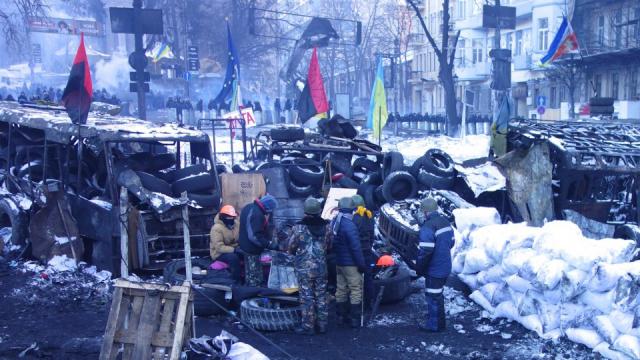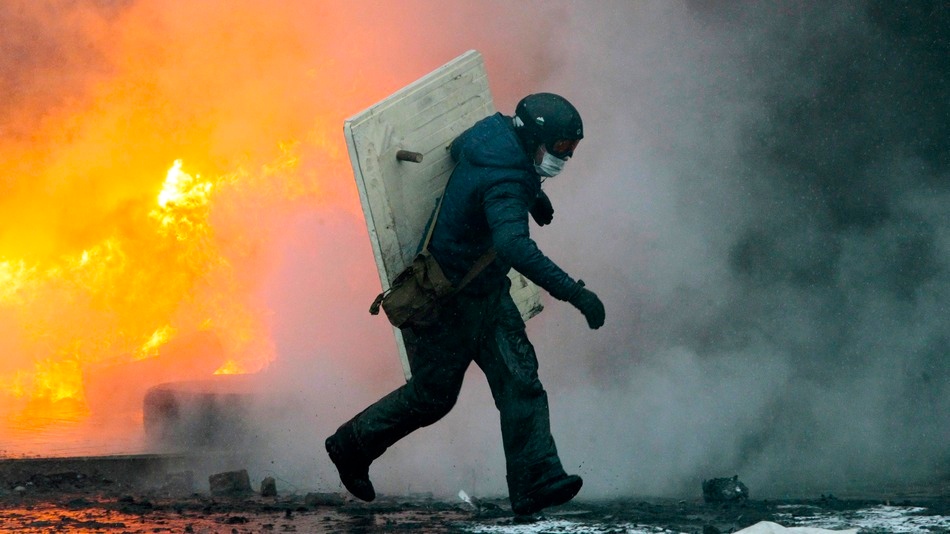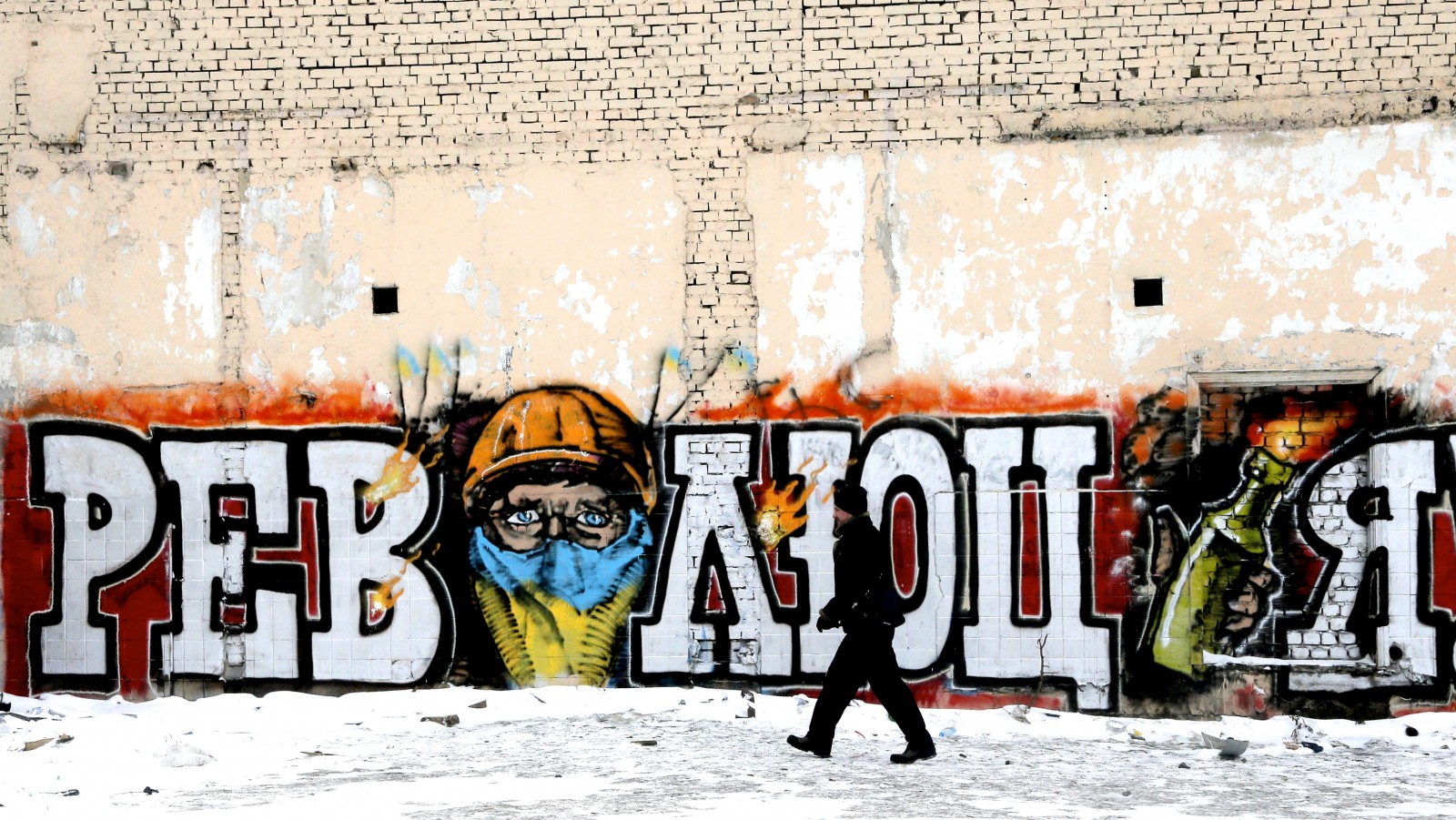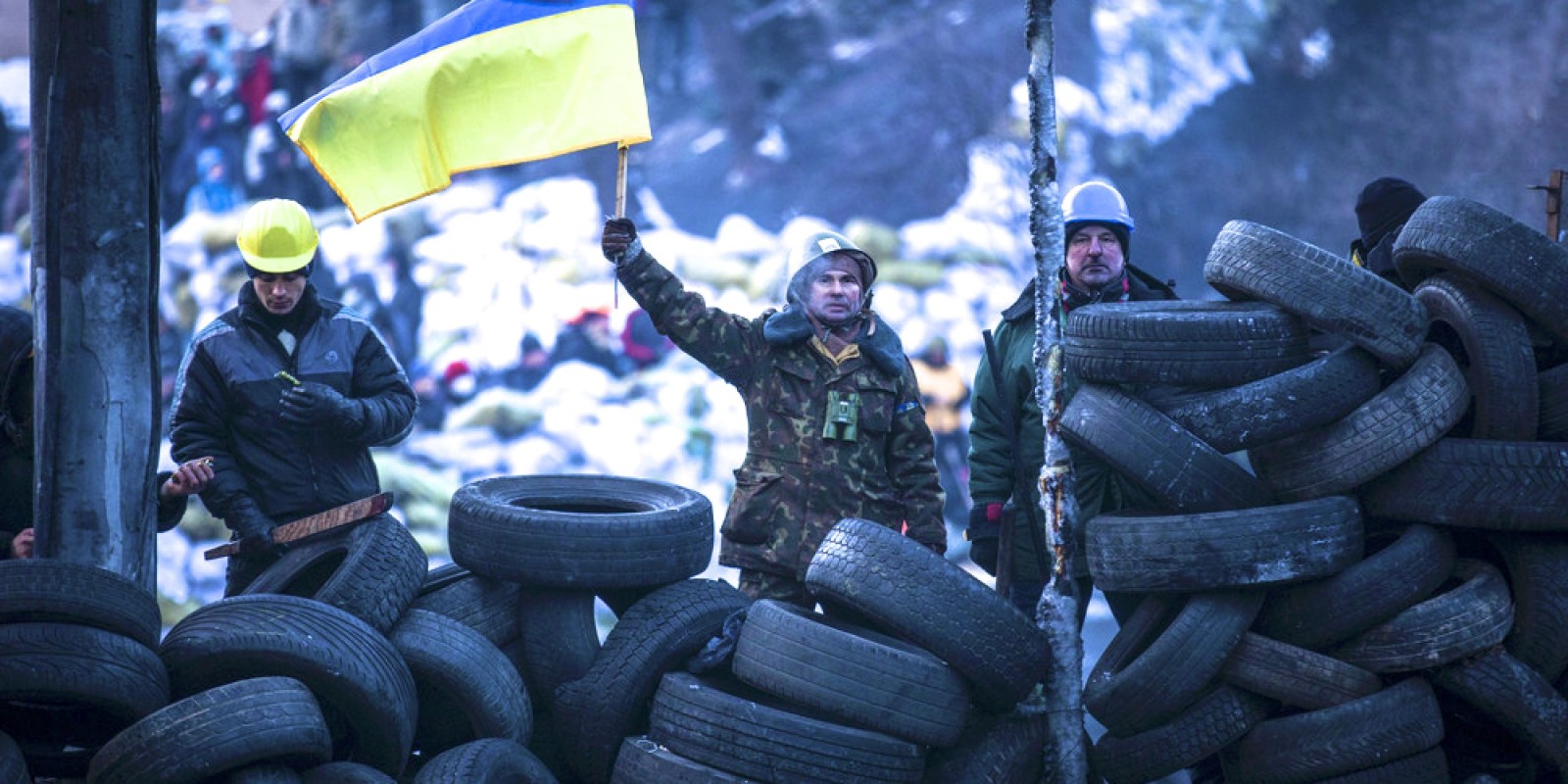
Photos by Filip Warwick
KIEV, Ukraine – Picks, shovels and axes fly as a small group of youths chip away at the ice that covers the cobblestone in Kiev’s Independence Square. This is not street cleaning. This ice is the remnants of spray from a police water cannon that just hosed down the square.
But protesters have dug a trench to channel the water and are using the ice collected to fill bags and reenforce barricades that demarcate a no-go zone for uniformed police.
For more than two months this area, known as the Maidan, has been occupied by a dogged people’s movement angry at the dual trend of endemic corruption and declining living standards in this former Soviet state on the E.U.’s doorstep.
“Living conditions have been deteriorating everywhere so a majority of the country is dissatisfied,” said Kateryna Zarembo, deputy director of Institute of World Policy, a pro-Western think-tank in Kiev.
Protesters say this isn’t about Ukraine’s orientation with Moscow or Europe but a rejection of kleptocracy at the highest levels.
"It's against the corrupt government in Ukraine, the government which doesn't listen to its people, a government whose members have become enormously rich over the last four years since they are in power,” said 28-year-old local journalist Olga Tokariuk who has joined the protests.
A symbol of popular discontent is President Viktor Yanukovych’s son, Oleksandr. After his father was elected in 2010, the 40-year-old dentist-turned-businessman saw his wealth climb from about $7 million to a personal fortune of $510 million, according to Forbes magazine.
But not everyone is enjoying flush times. Ukraine’s national currency is hovering near four-year lows, growth is stagnant and without outside assistance it is expected the country will go bankrupt.
The E.U. had proposed a free trade agreement that would open up the country to European firms and require a series of painful austerity measures imposed by the IMF – all that without the usual carrot of membership. Instead, Yanukovych turned his back on Brussels in November, opting instead for a $15 billion bailout in the form of loans from Russia.
Ukraine leadership has clashed with the IMF in the past; assistance was frozen in 2009 after disagreements over the minimum wage and subsidized natural gas, which is literally the lifeline for Ukrainian homes in wintertime.
Russia’s offer was attractive in the short-term, especially as it didn’t include European conditions of throwing open Ukraine’s market to foreign companies. But Yanukovych’s decision was met with howls of disapproval by Ukraine’s pro-Western nationalists, whose outrage sparked the mass protests that continue today.
Concessions have been few. Last week, Yanukovych dismissed the government’s cabinet ministers though opposition members called the move cosmetic, especially as the ministers remain at their posts until new appointments are announced.
Russian President Vladimir Putin has announced the aid is being suspended pending the formation of a new government in Kiev, adding a new level of pressure.
Perhaps sensing a renewed opportunity, this week Brussels hinted that it could counter the Russian offer. The E.U.’s foreign policy chief Catherine Ashton told the Wall Street Journal that the E.U. and United States were working on a new deal – its terms not final – but that it wouldn’t be contingent on the IMF’s unpopular austerity measures.
Meanwhile, the political crisis continues to exacerbate internal tensions. Many protesters are from the western, Ukrainian-speaking half of the country, who would like to see Ukraine integrate with the E.U. That’s in contrast to Russian-speaking citizens in the east and south – Yanukovych’s traditional power base – who are distrustful of the West and feel a deeper cultural and linguistic kinship to Russia.
Activist Oleskandr Gor, 33, lives in Kiev but was born and raised in the eastern city of Donetsk. He says despite claims that Maidan (Square) protesters are expressing the will of the country, deep divisions remain.
“It's a very contentious issue among political experts in Ukraine," Gor said. "But I can say from my personal experience that the divide is pretty dangerous.”
But others dismiss this notion, arguing that most pro-government demonstrators are bussed in and paid for their activism.
Still, tensions and violence continue to ebb and flow with clashes erupting last month that brought the death toll to at least six demonstrators and reports of more than a thousand injuries.
This week an uneasy calm hangs over Kiev’s Maidan with riot police and masked demonstrators engaged in a 24-hour staring contest across a line of control demarcated by ice bricks, burn barrels and scrap metal. Helmeted men with long wooden sticks man the checkpoints, enforcing the ban on alcohol and recreational drug use anywhere near the encampment.
Soup kitchens, tea stations and wood-burning stoves help thousands of demonstrators brave the subzero temperatures, camped out in canvas tents with wood burning stoves. This is a highly disciplined operation made possible by donations and support from surrounding residents.
"We have to support them," says 39-year-old Irina, a resident of Kiev who recently delivered a load of firewood and donated clothes to the square. “People of Kiev know that if Maidan fails - we'll all go to jail.”
Amnesty was offered to the more than 100 demonstrators who have been jailed in the past two months – on condition that the occupation of the square and administration buildings end. But the amnesty was roundly rejected by protest leaders and the impasse remains.
Anger was further stoked last weekend when a 35-year-old activist turned up in the outskirts after going missing for eight days. Dmytro Bulatov, badly disfigured, said he’d been kidnapped and tortured by unknown assailants. After threatening him with arrest, a court allowed him to flee the country.
It’s not an isolated case, say human rights lawyers.
“We have hundreds of people wounded or brutally beaten and not one case was properly investigated yet,” said Roman Romanov of the Soros Foundation-linked International Renaissance Foundation in Kiev. “There’s a lot of evidence of criminals using violence against the protesters in collaboration with the police forces – especially in the regions [outside Kiev].”
Opposition parties continue to make speeches and hold rallies on the Maidan but the movement’s ultimate strength continues to be its grassroots organization.
“It’s important to understand that this is not a protest organized by the political opposition and this is not about the changing the people at the top,” Romanov said. “This is a resistance movement against an attempt to establish a typical post-Soviet authoritarian regime in this country.”
Photos by Filip Warwick
3 WAYS TO SHOW YOUR SUPPORT
- Log in to post comments

















